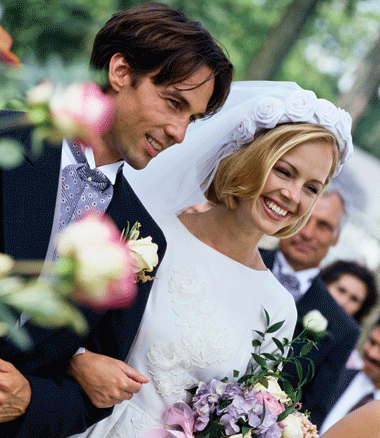 Why do people marry? What does a good relationship look like? What makes love last? One of the reasons marriage can be so difficult is because of what we think “love” is. The jumbled impressions and false expectations we receive from the media, family, friends and even the Church can leave us confused and discouraged.
Why do people marry? What does a good relationship look like? What makes love last? One of the reasons marriage can be so difficult is because of what we think “love” is. The jumbled impressions and false expectations we receive from the media, family, friends and even the Church can leave us confused and discouraged.
Here are some myths about love and marriage, followed by truths that can help strengthen our relationships.
MYTH: Romantic love will always remain at the same level of intensity. For partners contemplating the passionate thrill of the honeymoon, this may seem hard to swallow! In The Road Less Travelled, Dr. M. Scott Peck says that “no matter whom we fall in love with, we sooner or later fall out of love.” He dosen't mean we will stop loving our spouses but, rather, is referring to the waning of those intense and exciting falling-in-love feelings that can overwhelm us in the beginning.
TRUTH: Love deepens and matures over time. The initial passion sets the stage for true intimacy to develop and grow. Deep and satisfying physical, emotional, intellectual and spiritual intimacy strengthens the cord of commitment. Over the marital lifetime, while love may be a constant, the experience of love will change. Couples need to know that love is much more than a feeling. Feelings are fickle at best and can come and go like the wind. It's good to know that on the days when I don't feel particularly “in love” with my spouse, I don't have to live in dread, fearing that “love” has gone.
MYTH: My spouse will make me whole. This myth perpetuates the idea that successful couples are somehow “right” for each other, that every problem should magically resolve itself. Those having difficulty often begin to wonder if they have made a terrible mistake. This leads to unrealistic expectations and demands (for example, “If my spouse really loved me, he would make me happy”). Low self-esteem and codependence often characterize these relationships.
TRUTH: While it is mathematically true that two halves make a whole, it is not true relationally. The biblical equation of “two becoming one” suggests that it takes two complete, separate individuals to join together to successfully establish one relationship. In Saving Your Marriage Before It Starts, Drs. Les and Leslie Parrott note: “Marriage challenges us to new heights and calls us to be the best person possible, but neither marriage nor our partner will magically make us whole.” If all I bring to my relationship is my own neediness, then I will have little to put into it. On the other hand, if I am more concerned about being the right person as opposed to finding the right person, I will be in a place to give. And that's what relationships need to grow and flourish.
MYTH: If it takes hard work, it must be wrong. Some Christians assume that if God has brought them together, then married life should be easy. Not so! At marriage retreats and relationship seminars, my wife and I ask couples how much time they invest in their relationships. We are often met with blank stares and silence.
TRUTH: Most of us are busy with full-time jobs, sky-high mortgages and family concerns. But marriage, like everything else, does take work. And it's the kind of work that requires creativity, flexibility and lots of energy. Marriages do not reach their potential when they are on the bottom of the priority list. Often the rough edges of our personalities or unresolved personal issues come to light in the context of marriage. But problems do not suggest failure. Working through challenges as a couple contributes to emotional and relational growth.
Breaking down these myths is an ongoing process. As couples work together they will learn which expectations are realistic and healthy and which are not. Honestly sharing feelings of disappointment or dissatisfaction will help this process along.
So what healthy, realistic expectations can be applied to love and marriage? Here are a few to build on:
1. Expect your feelings to fluctuate from time to time. This is normal, healthy and predictable and is not reflective of a lack of love for each other.
2. Expect to complement each other with your differences and similarities. However, realize neither one of you can make the other whole.
3. Expect to learn and grow together as you invest time and energy in building your relationship.
Questions to Ask Yourself
What is the purpose of a good marriage?
What is our greatest strength as a couple?
How will we celebrate birthdays, anniversaries and special days?
What does romance look like to me?
What kinds of things will I do to show my spouse that I love him/her?
 Major Bob Armstrong and his wife, Penny, are the corps officers of The Willows, a community church of The Salvation Army in Langley, B.C. The parents of three young men, Bob and Penny have ministered as a team for 26 years in various capacities: pastors, church planters, facilitators of reconciliation, counsellors, educators and conference speakers. Both are registered clinical counselors and authors of the Couple Care Pre-Marriage Manual, Along the Way and Broken Church Restored. Along the Way: A Practical Guide to Help Couples can be purchased for $12 plus shipping by emailing Bob_Armstrong@can.salvationarmy.org.
Major Bob Armstrong and his wife, Penny, are the corps officers of The Willows, a community church of The Salvation Army in Langley, B.C. The parents of three young men, Bob and Penny have ministered as a team for 26 years in various capacities: pastors, church planters, facilitators of reconciliation, counsellors, educators and conference speakers. Both are registered clinical counselors and authors of the Couple Care Pre-Marriage Manual, Along the Way and Broken Church Restored. Along the Way: A Practical Guide to Help Couples can be purchased for $12 plus shipping by emailing Bob_Armstrong@can.salvationarmy.org.









Leave a Comment